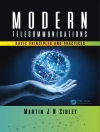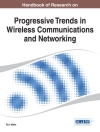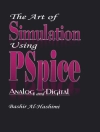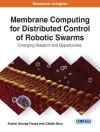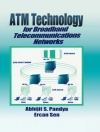Semiconductor-based Ultra-Fast All-Optical Signal Processing
Devices -a key technology for the next generation of
ultrahigh bandwidth optical communication systems!
The introduction of ultra-fast communication systems based on
all-optical signal processing is considered to be one of the most
promising ways to handle the rapidly increasing global
communication traffic. Such systems will enable real time
super-high definition moving pictures such as high reality
TV-conference, remote diagnosis and surgery, cinema entertainment
and many other applications with small power consumption. The key
issue to realize such systems is to develop ultra-fast optical
devices such as light sources, all-optical gates and wavelength
converters.
Ultra-Fast All-Optical Signal Processing Devices
discusses the state of the art development of semiconductor-based
ultrafast all-optical devices, and their various signal processing
applications for bit-rates 100Gb/s to 1Tb/s.
Ultra-Fast All-Optical Signal Processing Devices:
* Provides a thorough and in-depth treatment of the most recent
achievements in ultrafast all-optical devices
* Discusses future networks with applications such as HD-TV and
super-high definition moving screens as a motivating background for
devices research
* Covers mode-locked semiconductor lasers, electro-absorption
modulator based 160Gb/s signal sources, SOA based symmetric
Mach-Zehnder type all-optical gates, intersubband transition gate
device, and more
* Explains the technical issues behind turning the ultra-fast
optical devices into practical working tools
* Examples of above 160Gb/s transmission experiments
* Discusses future prospects of the ultra-fast signal processing
devices
This invaluable reference will provide device researchers and
engineers in industry, researchers at universities (including
graduate students, and post doctorial researchers and professors)
and research institutes with a thorough understanding of ultrahigh
bandwidth optical communication systems. Device and communication
market watchers will also find this book useful.
İçerik tablosu
CHAPTER 1. Introduction
1.1 Evolution of optical communication systems and devicetechnologies
1.2 Increasing communication traffics and power consumption
1.3 Future networks and technologies
1.4 Ultrafast all-optical signal processing devices
1.5 Overview of the devices and their concepts
1.6 Summary
CHAPTER 2. Light Sources
2.1 Requirement for light sources
2.2 Mode-locked laser diodes
2.3 Electro-absorption modulator (EAM) based signal source
2.4 Summary
CHAPTER 3 Semiconductor optical amplifier basedultrafast signal processing devices
3.1 Introduction
3.2 Fundamental of SOA
3.3 SOA as an ultrafast nonlinear medium
3.4 Use of ultrafast response component by filtering
3.5 Symmetric Mach-Zehnder (SMZ) all-optical gate
3.6 Summary
CHAPTER 4Uni-traveling-carrier photodiode (UTC-PD)and PD-EAM optical gate integrating a UTC-PD and a traveling waveelectro-absorption modulator
4.1 Introduction
4.2 Uni-traveling-carrier photodiode (UTC-PD)
4.3 Concept of new opto-electronic integrated device
4.4 PD-EAM optical gate integrating UTC-PD and TW-EAM
4.5 Summary and prospects
CHAPTER 5 Intersubband transition all-opticalgates
5.1 Operation principle
5.2 Ga N/Al N ISBT gate
5.3 (Cd S/Zn Se)/Be Te ISBT gate
5.4 In Ga As/Al As/Al As Sb ISBT gate
5.5 Cross-phase modulation effect in In Ga As/Al As/Al As Sb ISBTgate
5.6 Summary
CHAPTER 6 Wavelength conversion devices
6.1 Introduction
6.2 Wavelength conversion schemes
6.3 Physics of four-wave mixing in LDs and SOAs
6.4 Wavelength conversion of short pulses using FWM insemiconductor devices
6.5 Experimental results of wavelength conversion using FWM in SOAs and LDs
6.6 The future view of wavelength conversion using FWM
6.7 Summary
CHAPTER 7 Summary and future prospects
7.1 Introduction
7.2 Transmission experiments
7.3 Requirements on devices and prospects
7.4 Summary and future prospects
Yazar hakkında
Dr Hiroshi Ishikawa, Tsukuba, Japan
Dr Ishikawa is the Director of the Ultrafast Photonic Devices Laboratory in National Institute of Advanced Industrial Science and Technology (AIST) in Japan. He worked for research and development of optical semiconductor devices in Fujitsu Labs Ltd from 1972 to 2001. In 2001 he moved to Femtosecond Technology Research Association Central Res. Lab. as a group leader of ultrafast all-optical switching devices. He is at AIST since 2004. He is a member of Japan Society of Applied Physics, The Physical Society of Japan, The Institute of Electronics, Information and Communication Engineers, and IEEE (Fellow).


